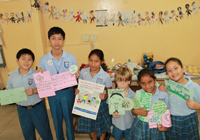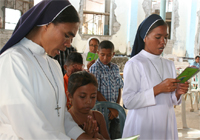Religious leaders, governments, civil society organizations and United Nations agencies join forces on the World Day of Prayer and Action for Children to protect children from violence
KABUL, Afghanistan, 27 December 2012 – During this year’s World Day of Prayer and Action for Children, thousands of worshippers in hundreds of mosques across Afghanistan listened to and participated in discussions that focused on preventing child marriage and corporal punishment, and on the importance of birth registration – all through the lens of Islam.
“According to Islamic principles, if we want to build a prosperous nation, we must build prosperous families. Children are the future of the families and upcoming leaders of our nations,” said director of Islamic education with the Ministry of Hajj and Religious Affairs Murtaza Hamid, in support of the World Day of Prayer and Action for Children.
Working with religious leaders
 Launched in 2008, the World Day of Prayer and Action for Children works with diverse religious communities, governments, civil society organizations and United Nations agencies to accelerate efforts to protect children around the world and use their influence to bring about change that will enable children to play, learn and grow in a safe and healthy environment. Inspired by the Convention on the Rights of the Child, the World Day of Prayer and Action for Children is observed on 20 November to coincide with the Convention’s anniversary and Universal Children’s Day.
Launched in 2008, the World Day of Prayer and Action for Children works with diverse religious communities, governments, civil society organizations and United Nations agencies to accelerate efforts to protect children around the world and use their influence to bring about change that will enable children to play, learn and grow in a safe and healthy environment. Inspired by the Convention on the Rights of the Child, the World Day of Prayer and Action for Children is observed on 20 November to coincide with the Convention’s anniversary and Universal Children’s Day.
Working with religious leaders is a key component of UNICEF’s efforts to protect children, particularly in rural areas where religious leaders have great influence.
In Kabul, at an event co-sponsored by the Government of Afghanistan and UNICEF, 500 religious leaders from around the country came together to discuss how they can use their influence to protect children from violence. The event was one of dozens of UNICEF-supported activities that took place in various countries to celebrate the World Day of Prayer and Action for Children.
Focus on non-violence
Last year, the World Day of Prayer and Action for Children adopted a three-year theme of violence against children, a broad topic that touches upon many themes, including non-violent discipline/positive parenting, birth registration and child marriage.
In a statement prepared in honor of this year’s World Day of Prayer and Action for Children, Archbishop Desmond Tutu identified child marriage as a form of violence against girls that denies their fundamental human rights. “Every year, more than 10 million girls are married as children. They enter a union in which they are likely to suffer violence and abuse, and which can cause untold psychological harm,” he said. “That is why, on this year’s World Day of Prayer and Action, I call on the community of faith to do everything in our power to end child marriage and ensure that girls can fulfil their God-given potential.”
Interfaith activities around the world
 Building on its long history of working with religious communities from all faiths on issues that affect children, UNICEF supported activities all over the world to mark the 2012 World Day of Prayer and Action for Children, including:
Building on its long history of working with religious communities from all faiths on issues that affect children, UNICEF supported activities all over the world to mark the 2012 World Day of Prayer and Action for Children, including:
Islamic Republic of Iran – In coordination with the National Body on the Convention on the Rights of the Child (NBCRC), a half-day event focusing on addressing violence against children (especially within religious communities) was organized. The Minister of Justice, members of the NBCRC Coordination Council, comprising more than 16 government and non-governmental organizations, main religious leaders and media participated.
Liberia – With support from UNICEF, the Religions for Peace–affiliated Inter Religious Council and partners organized a candle-lighting event in observance of the World Day of Prayer and Action for Children. The event brought together the Liberia Council of Churches, the Liberia National Muslim Council, government ministries and civil society organizations. Candle-lighting ceremonies, organized in many communities, are meant to shed light on hidden forms of abuse and exploitation that children suffer and end the silence surrounding this abuse.
Panama – Under the theme of ‘Violence Free Adolescence’, activities planned by UNICEF, together with the Global Network of Religions for Children, included religious services from various faiths focusing on a violence-free adolescence, a resolution signed by major religious and indigenous leaders addressed to media organizations calling on them to highlight the positive role adolescents play in Panamanian society, in-person activities during which adolescents shared their prayers and reflections on a violence-free adolescence and a radio programme featuring a spokesperson from the Catholic church and the UNICEF Panama Representative.
South Sudan – World Day of Prayer and Action for Children activities focused on ending child marriage and on a call for action for the Government to ratify the Convention on the Rights of the Child. Main participants included religious and traditional leaders, parliamentarians, policy-makers and opinion leaders.
By Genine Babakian
Read the original article on UNICEF website.